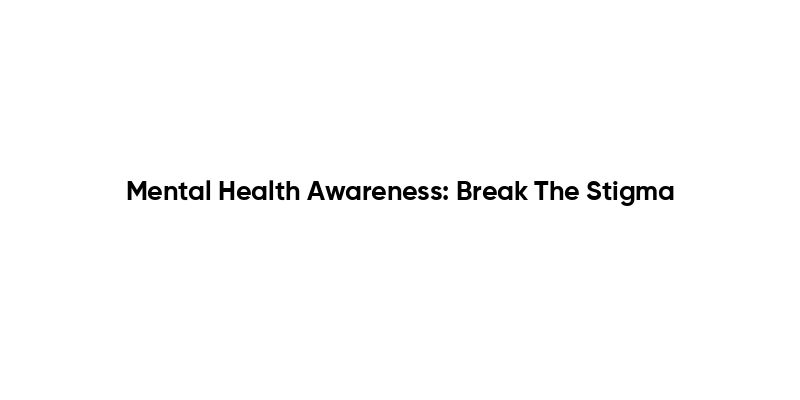Mental health awareness is a crucial topic that deserves our attention and understanding. The phrase “Break The Stigma” encapsulates the urgent need to address the misconceptions and biases surrounding mental health issues. By fostering an environment where individuals feel safe to discuss their mental health, we can create a supportive community that encourages healing and growth. This article will delve into the significance of mental health awareness, the impact of stigma, and the steps we can take to promote a more inclusive dialogue.
In the following sections, we will explore the various dimensions of mental health, including common disorders, their symptoms, and the importance of seeking help. You will learn about the societal barriers that perpetuate stigma and how they can be dismantled through education and empathy. Additionally, we will provide practical tips on how to support yourself and others in navigating mental health challenges. By understanding these aspects, you will be better equipped to contribute to a culture that prioritizes mental well-being.
We invite you to continue reading and join us in this vital conversation. Together, we can break the stigma surrounding mental health and pave the way for a future where everyone feels empowered to seek help and share their experiences. Your journey towards understanding and supporting mental health starts here—let’s take the first step together!
Understanding Mental Health Disorders
Mental health disorders encompass a wide range of conditions that affect mood, thinking, and behavior. Common disorders include anxiety, depression, bipolar disorder, and schizophrenia. Understanding these conditions is crucial for breaking the stigma surrounding mental health. Many people suffer in silence due to misconceptions and lack of knowledge about these disorders.
Education plays a vital role in dispelling myths associated with mental health. For instance, many believe that mental health issues are a sign of weakness or that individuals can simply “snap out of it.” In reality, these disorders are complex and often require professional treatment. By fostering a better understanding of mental health disorders, we can create a more supportive environment for those affected.
The Impact of Stigma on Individuals
The stigma surrounding mental health can have devastating effects on individuals. Many people avoid seeking help due to fear of judgment or discrimination. This can lead to worsening symptoms and a decline in overall well-being. The internalization of stigma can also result in feelings of shame and isolation, further exacerbating mental health issues.
Research indicates that individuals who experience stigma are less likely to pursue treatment, which can prolong their suffering. It is essential to recognize the impact of stigma not only on individuals but also on families and communities. By addressing stigma, we can encourage more people to seek help and support, ultimately leading to better mental health outcomes.
Promoting Open Conversations About Mental Health
Encouraging open conversations about mental health is a powerful way to break the stigma. When individuals share their experiences, it normalizes the discussion around mental health and fosters understanding. Support groups, community events, and social media campaigns can all serve as platforms for these conversations.
Moreover, workplaces and educational institutions can play a significant role in promoting mental health awareness. Implementing mental health days, workshops, and training can create a culture of openness and support. By prioritizing mental health in various settings, we can help individuals feel more comfortable discussing their struggles and seeking help.
The Role of Media in Shaping Perceptions
The media has a significant influence on public perceptions of mental health. Unfortunately, many portrayals of mental illness in movies, television, and news can perpetuate stereotypes and misinformation. However, when done responsibly, media can also be a powerful tool for raising awareness and promoting understanding.
Positive representation of mental health in media can help challenge stereotypes and encourage empathy. Documentaries, articles, and social media campaigns that highlight real stories of individuals overcoming mental health challenges can inspire others to seek help. It is crucial for media creators to approach mental health topics with sensitivity and accuracy to foster a more informed public.
Resources for Mental Health Support
Access to mental health resources is essential for individuals seeking help. Various organizations provide support, including hotlines, counseling services, and educational materials. Knowing where to find help can empower individuals to take the first step toward recovery.
Additionally, community resources such as local mental health clinics, support groups, and online platforms can offer valuable assistance. It is important for individuals to understand that they are not alone and that help is available. By promoting these resources, we can encourage more people to seek the support they need and deserve.
Mental health awareness is crucial in promoting understanding and support for individuals facing mental health challenges. Breaking the stigma surrounding mental health can lead to better outcomes for those affected.
| Key Concepts | Description |
|---|---|
| Understanding Mental Health | Mental health encompasses emotional, psychological, and social well-being. It affects how we think, feel, and act. |
| The Importance of Awareness | Raising awareness helps to educate the public, reduce misconceptions, and promote empathy towards those with mental health issues. |
| Breaking the Stigma | Stigma can prevent individuals from seeking help. Open conversations and education can help dismantle these barriers. |
| Support Systems | Encouraging supportive environments, whether at home, work, or in the community, is essential for those struggling with mental health. |
| Resources and Help | Access to mental health resources, such as therapy and support groups, is vital for recovery and well-being. |
| Advocacy | Advocating for mental health policies and funding can lead to improved services and support for those in need. |
By fostering a culture of understanding and support, we can break the stigma surrounding mental health and encourage individuals to seek the help they need.




